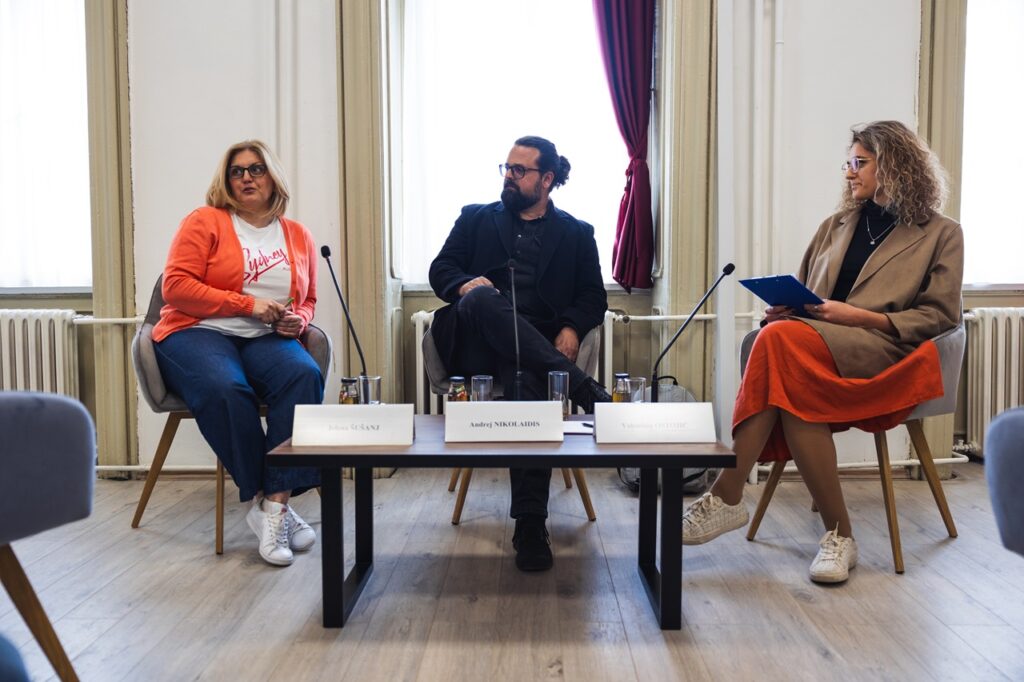“Nurturing linguistic and cultural differences must begin with education, foster then within that system rather than stifling them with negative judgments, as diversity reflects the beauty of each individual, and dialogue must be conducted with arguments and facts”, was the message conveyed today at a public forum on interculturalism organized by the Centre for Civic Education (CCE) at the Faculty for Montenegrin Language and Literature (FCJK) in Cetinje.
Andrej Nikolaidis, writer and activist, addressed the burning of his doll at the carnival, characterizing it as an “act of wild love”. “The opposite of love is indifference, and that would affect me more. The idea is packaged in the form of a carnival, but the point of burning the carnival is to burn someone who holds power, because it serves as a kind of social valve. I am not a power holder, except when I write texts, and even then, power encounters me. I irritate them because I write the truth in a way that cannot be misinterpreted. We cannot agree on some things, such as what is the truth about Dubrovnik, the war in Bosnia, Srebrenica… The idea that there was no genocide in Srebrenica is equal to the idea that the earth is flat,” assessed Nikolaidis. However, he also sees a positive aspect in this act. “The result of that is the texts that are coming out now. By burning my doll and delivering a disgusting speech, they gave my book a story,” he said.
“Our multiculturalism should be our civil state, but now it is a facade. Constitutionally, it is civil, which would mean that citizens are equal, and then it doesn’t matter who is who. However, this is not a realistic situation. We have an awareness of the dominant people and culture, and that should not exist in a civil state as a state of citizens,” believes Nikolaidis. He sees the data on ethnic distances and prejudices as another confirmation that Montenegro is not civic. “And that should not be surprising, because everything that has been happening in this region since the end of the war in Bosnia is just the continuation of wars by other means. Unfortunately, the dominant political, economic and cultural power in the region, Serbia, and the political and intellectual elite there, has neither an alternative nor an idea other than the imperial idea, which can be called Greater Serbia, Open Balkans… To conduct politics as if you are not aware of the non-existence of progressive of politics – and enough destruction has been done for that idea to be erased – is extremely irresponsible. That’s how you become prime minister; you get votes. But, what will you do tomorrow when the same policy awaits you?”, concluded Nikolaidis.
Jelena Šušanj, a professor at FCJK, considers multiculturalism to be an inherited state for which modules need to be found to sustain it. “From the perspective of language, there is no correct or most beautiful language, but each reflects the culture they carry. When we talk about culture, we don’t always mean interethnic or religious differences, but also individual ones expressed through language. Therefore, I emphasize as a proof of diversity that there is nothing primitive in language or culture,” said Šušanj.
She believes that nurturing linguistic and cultural differences must start with education. “Our educational system, no matter how constitutionally we define ourselves as a civic state, does not foster multiculturalism in a significant segment of our population and does not consider bringing culture closer to those who do not belong to that culture,” explained Šušanj. She expressed concern about the consequences created by relativization and changes in historical viewpoints. “What is offered to our youth can be judged by the way the youth celebrate graduation. These are collective moments of coming out with flags, fascist songs, calls to fight and conquest, negation of ethnicity, language… Only fundamental changes in the education system, which are not in the form and reducing the curriculum, can produce different people and be healing,” she stated.
The aim of the forums on interculturalism is to raise public awareness, especially in local communities, about the value and importance of participating in the promotion of interculturalism as a framework that contributes to the realization of the rights of minority peoples and other minority national communities.
The forum is organized within the project “Bridges of Multiculturalism through Museum Education” implemented by CCE with the support of the Ministry of Human and Minority Rights.
Maja Marinović, Programme Associate


